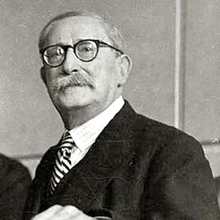Ricerca Veloce
Ricerca Avanzata

Léon Blum
Léon Blum nasce il 9 aprile 1872 a Parigi. Nel 1890 entra all’École normale supérieure, ma è espulso alla fine del primo anno, non essendo riuscito a superare l’esame. Indeciso tra giurisprudenza e letteratura, si iscrive alla Sorbona a entrambi i corsi di laurea, avendo in mente una carriera nel settore pubblico. Si laurea in lettere nel 1891 e in giurisprudenza nel 1894. Léon Blum è ammesso, alla sua seconda domanda, al Consiglio di Stato all’età di 25 anni, dove diviene praticante nel dicembre 1895 e vi compie una brillante carriera durante quasi 25 anni, interrotta soltanto dalle funzioni di capo di gabinetto di Marcel Sembat, ministro socialista dei Lavori Pubblici nel 1916, nel governo Viviani.
Léon Blum inizia la propria militanza politica alla Sezione Francese dell’Internazionale Operaia (SFIO). In compagnia di Jaurès, nel 1904 partecipa alla fondazione de «L’Humanité». Alla morte di Jaurès, ucciso da un fanatico nell’agosto 1914, Blum ne raccoglie l’importante eredità ideologica, ma è soprattutto lo scoppio della prima guerra mondiale che lo spinge a entrare in politica.
In seguito è eletto segretario del partito e poi presidente del gruppo parlamentare socialista.
Tra i socialisti, a livello internazionale, si delineano due grandi tendenze di lotta contro il fascismo. Da una parte una frangia più a destra che vuole adattare il socialismo alla classe media; e dall’altra parte una tendenza di sinistra che propone “una tattica rivoluzionaria di lotta proletaria per la conquista del potere”. Blum prevede anche di insistere sugli interessi comuni tra le classi medie e le classi operaie. Nell’aprile 1936, gli accordi del Fronte popolare permettono la vittoria alle elezioni legislative e portano al primo governo a maggioranza socialista della Terza Repubblica. Blum diviene Presidente del Consiglio a partire da giugno. L’arrivo di Blum al potere scatena anche un’ondata di antisemitismo di grande portata. Egli è odiato e ingiuriato come raramente succederà nella politica francese, sebbene molto agitata. Blum presenta le dimissioni nel giugno 1937 e il suo governo è sostituito da uno a guida radicale.
Léon Blum guiderà poi l’ultimo governo provvisorio prima dell’inizio della Quarta Repubblica, dal dicembre 1946 al gennaio 1947. Si ritira infine a Jouy-en-Josas, vicino Versailles, dove muore il 30 marzo 1950 di infarto all’età di 77 anni. Rimane direttore politico del «Populaire» fino alla fine.
Léon Blum
was born on 9 April 1872 in Paris. In 1890 he entered the École normale
supérieure, but was expelled at the end of the first year, having failed the
exam. Undecided between law and literature, he enrolled in both degrees at the
Sorbonne, having a career in the public sector in mind. He graduated in
literature in 1891 and in law in 1894. Léon Blum was admitted, on his second
application, to the Conseil d'Etat at the age of 25, where he became a trainee
in December 1895 and completed a brilliant career there for almost 25 years,
interrupted only by his functions as head of cabinet for Marcel Sembat,
Socialist Minister of Public Works in 1916, in the Viviani government.
Léon Blum
began his political militancy in the French Section of the Workers'
International (SFIO). In the company of Jaurès, he participated in the founding
of 'L'Humanité' in 1904. When Jaurès died, murdered by a fanatic in August
1914, Blum took up his important ideological legacy, but it was above all the
outbreak of the First World War that prompted him to enter politics.
He was
later elected party secretary and then president of the Socialist parliamentary
group.
Among the
socialists, two major trends in the fight against fascism emerged. On the one
hand a more right-wing fringe that wants to adapt socialism to the middle
class; and on the other hand a left-wing tendency that proposes 'a
revolutionary tactic of proletarian struggle for the conquest of power'. Blum
also plans to insist on common interests between the middle and working
classes. In April 1936, the People's Front agreements allow victory in the
legislative elections and lead to the first socialist majority government of
the Third Republic. Blum became Prime Minister in June. Blum's arrival in power
also triggers a wave of far-reaching anti-Semitism. He is hated and insulted in
a way that rarely happens in French politics, albeit very agitated. Blum resigns
in June 1937 and his government is replaced by a radical-led one.
Léon Blum
then led the last provisional government before the start of the Fourth
Republic, from December 1946 to January 1947. He finally retired to
Jouy-en-Josas, near Versailles, where he died on 30th March 1950 of a heart
attack at the age of 77. He remained political editor of the 'Populaire' until
the end.
